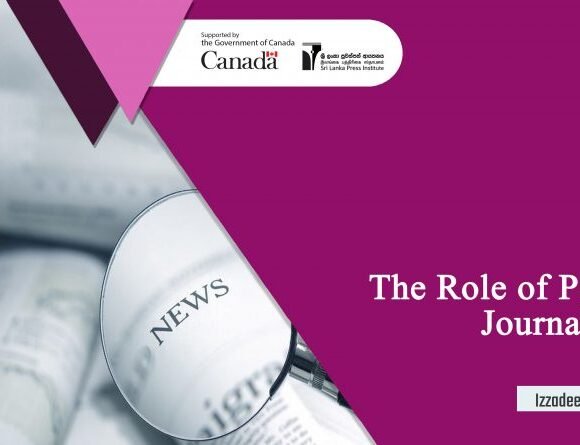
Fake news in Social Media and its Process of Building Political Agendas
Written by – I. K. Prabha
“Sunatha, Dharetha Charatha Dhamme – Dhamma should be understood after hearing and comprehending well”, is one of the Buddha’s teachings. The phrase, “he who hears what the speaker says should listen consciously”, is used in day-to-day life. When focusing on the political communication process, fake news distorts and fabricates true news directly and indirectly, also creating images of individuals and political parties, regardless of media regulation and censorship in popular media culture. The main purpose of fake news reporting is to present untrue information about an individual or an ethnic community.
Introducing the concept of ‘Go Viral’ in the book “Journal of Experimental Psychology” (Dr Sander Van der Linen) under the auspices of the British Government, the author points out that fake news is spreading like a virus in the community. Also, the book points out that the diffusion of fake news helps to categorize information, and that the majority of them adversely affect the reputation of an individual or an organization.
(https//blog.hubspot.com/marketing/viral-campaigns)
When questioned about fake news being spread on social media, senior journalist Mr. Amantha Wijesuriya said that “fake news creation has appeared since 1990 and it has been rampant in Sri Lankan society since 2004 and now we are unable to distinguish between true and false news as false news now spreading through social media drivers”. He also points out that “the new media, which emerged as a culmination of the mainstream media, is still a gross communicative medium for the Sri Lankan people as it has spread in Sri Lankan society even before spreading in Europe. As the political arena is unique, it can cover a large space with very little information and can be used to create public opinion and to gain public displeasure, saying that many things that are difficult to highlight in the mainstream media, for example, social media platforms can quickly provoke racist and religious issues”.
“When focusing on media regulation and freedom of expression, there is no right to regulate the media on social media, and the value of social media declines when people who do not have required space and maturity to express their views in the mainstream media go out to express their views on social media”, Mr Wijesuriya added.
“Social media is something that transcends geography. Except countries like China, Cuba and North Korea, Sri Lankans who are living in Japan, England, Australia, the United States and Europe are provoking issues like racism and there is no need for Tamils or Sinhalese who are living in this country to highlight issues like racism”, he pointed out.
In such a context, he says, “the value of social media is diminished by the fact that various groups expressed their views on critical issues such as the 20th Amendment, and it is unnecessary for everyone to comment on things they do not particularly know”. Commenting on the practicality of using social media guidelines and ethics to curb the spread of fake news, he said that “everything on social media is proceeding invisibly”. For example, things such as homicides, murders, injuries and suicides should not be reported in the media, as well as in news when it poses a threat to national security. “In such a context, a positive circumstance can never be expected on social media, and even parents cannot control their child’s social media usage. Enforcing ethics or guidelines on social media unless implementing self-censorship or self-regulation of the individual’s social media usability is just something hilarious”, Mr Wijesuriya emphasized.
He finally mentioned that “fake news on social media has both direct and indirect impacts on Sri Lankan political culture and the political agenda-building process. Fake news was created to launch election campaigns in more or fewer practices of both political parties that are in power for the last six years. Gotabhaya Rajapaksa who gained the least popularity among the people after the imprisonment of Sarath Fonseka in 2009, was finally elected as the current first citizen of the country with 69 lakhs of votes especially after the Easter attack. The environment and background behind the recent Presidential Election have been built in a very subtle and positive way, and fake news has been tactically used in the process of building this political agenda”.
In January 2017, the UK Parliament conducted an inquiry and found that the value of true news content is diminished by the strength of fake news content. Furthermore, with the advancement of technology, the use of social media has increased among the people which has in turn increased the likelihood of spreading fake news anonymously in social media spaces. The study further shows that making money is the main objective and it can be observed that it is always in conflict with the existing society.
This situation takes a very different form when focusing on Sri Lankans who engage in politics. Here we can identify those who support them from the top to the bottom of the political franchise, especially those with personal disabilities, as well as their family members and neighbours who creatively fabricate fake news and negative propagation, not revealing the true identity of the original creator of the news. The fact that people who live in an information society are unable to distinguish between true and false information is the biggest challenge at present. In order to change this situation, subjects where it’s easy to identify the accuracy of the information should be included in the curriculum of school children as well as training programs implemented by trained teachers in this regard. It is the responsibility of political, civic and media authorities as well as society to take necessary steps to increase the media literacy of all people.








